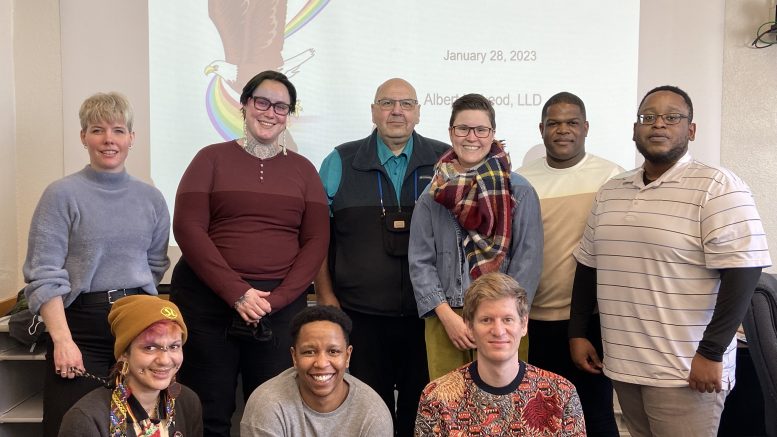Gigii-bapiimin is an Ojibwe language term meaning, “we survived.”
It is an expression that reflects the resilience and strength of Indigenous people.
The Gigii-Bapiimin study, launched by the Village Lab — U of M’s faculty of social work community-based interdisciplinary health research lab — applies this concept to the continued survival of Indigenous people through past and present pandemics.
In this study, the research lab explores the impact of the COVID-19 pandemic on the well-being of Indigenous people living with HIV-AIDS in Manitoba and Saskatchewan communities, as well as the resilience of those living in said communities.
Community is at the centre of the Village Lab. For its director, Rusty Souleymanov, this entails collaborating with community members and using community-based research practices while operating at an intersection of health and social sciences.
“It’s all about peers, it’s all about community, and that’s where the power lies with our lab,” he said.
Souleymanov, who received his PhD at the University of Toronto, is currently an associate professor at the U of M’s faculty of social work and director of the Village Lab, and has been actively engaged as a community-based HIV and harm-reduction researcher in Canada over the past 13 years.
Souleymanov seamlessly blends his expertise in social work, public health and psychology in working with socially and economically marginalized communities to address both health and social equity issues.
Since its launch in 2021, the Village Lab has focused on three main aspects — creating meaningful research partnerships, producing novel research and building skills and increasing capacity among community partners and peers through training community members and students.
Teamwork is also a vital part of the Village Lab.
The team includes an Indigenous Elder — who guides the research to ensure cultural safety and relevance — undergraduate and graduate research assistants, co-ordinators, community members and multiple guiding circles representing diverse communities.
“We always listen to the voices on the ground and we always listen to the voices from the community,” Souleymanov said.
By actively involving participants and researchers in shaping the research process, the lab works toward truth and reconciliation. This allows for accessible data relevant to communities, made available through community reports, infographics, workshops and training opportunities.
The Gigii-Bapiimin study is just one of several impactful projects the Village Lab has undertaken since its establishment.
The first project they undertook, the Migration and Health Study, focused on understanding systemic barriers to health-care access faced by new migrants and refugees in Manitoba — shedding light on issues like racism and insensitivity in health care.
Another project, the Manitoba Two-Spirit, Gay, Bisexual and Queer Men’s Health Study, examined health-care access for sexual and gender-minority men, with a specific emphasis on HIV services.
The Village Lab has also worked with Black, African and Caribbean communities through its Ubuntu-Pamoja Study to improve HIV testing accessibility and safety.
And then there’s the HIV Doula Project. This is centred on Indigenous doulas — individuals who assist new mothers and provide support during birth work.
“We’re training them to engage more in HIV prevention because there’s a lot of vertical transmission from parents to children in terms of HIV and other sexually transmitted infections,” Souleymanov explained.
Community training does not stop there for the Village Lab.
Through its Investigaytors program, the lab offers an accessible and inclusive space for members of the 2SLGBTQIA+ community to engage in health research, while learning valuable research skills.
This year, the program focused on mental health and incorporated creative participatory research methods like poetry, photovoice, photography and drag performance.
“We use arts-based methods to make sure we don’t lose on any voices from the community, to make sure research becomes accessible to communities,” Souleymanov said.
For Souleymanov, the work has only just begun at the Village Lab.
He expressed anticipation for continued energy and participation from the community, and continues to seek funding from the government and community organizations.
“We are making sure that our impact is even bigger in the community,” he said. “We want to make sure that we are really not just producing research knowledge, but also affect policy at the ground level.”



